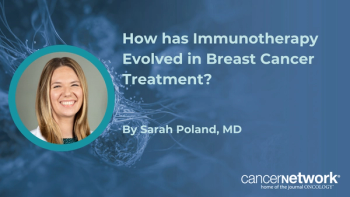
Breast Cancer Family History Does Not Mean Poor Prognosis
A new study suggests that a family history of breast cancer does not result in a worse prognosis breast cancer prognosis.
A new study suggests that breast cancer patients with a family history of the disease do not have a worse prognosis.
The POSH (Prospective Outcomes in Sporadic vs Hereditary Breast Cancer) study looked at 2,956 patients, age 40 or younger, undergoing treatment for breast cancer. Those with a family history of the disease did not have a greater risk of cancer recurrence after 5.9 years of follow-up. The study was
Women who had close relatives diagnosed with either breast or ovarian cancers did not have a significantly shorter distant disease-free interval compared with women with breast cancer who had no family history of these diseases (hazard ratio = 0.89; 95% CI, 0.76–1.03; P = .12). There was also no difference when patients were stratified by estrogen receptor (ER)-positive or ER-negative disease (P = .101 and P = .589, respectively).
“Successful treatment for breast cancer is just as likely in young patients with a family history of breast cancer, as in those without a family history,” said study author Ramsey Cutress, MB, BCh, PhD, associate professor in breast surgery at the University of Southampton, in a statement. “Patients with a family history of breast cancer can therefore be reassured that their family history alone does not mean that their outcome will be worse.”
It is estimated that about 25% of breast cancers have a hereditary basis and these types of tumors typically present earlier in life compared with sporadic tumors. Younger women diagnosed with breast cancer are more likely to have ER-negative disease and a higher tumor grade upon diagnosis, according to previous research.
In the current study, 65.9% of the women had no family history, and 34.1% of the women had either breast or ovarian cancers in at least one first- or second-degree relative. Women with a family history of these cancers were more likely to have been diagnosed with grade 3 tumors (63.3% compared with 59.8%). Women with no family history were significantly more likely to present with HER2-positive disease (28.8% compared with 24.7%; P = .031).
There were no significant differences in either median tumor diameter, lymph node status, lymphovascular invasion, or presence of metastasis at diagnosis between the two groups.
Patients with a first-degree relative with a history of disease had a smaller median tumor size (20 mm compared with 23 mm, P = .004).
“This study demonstrates that family history per se is not an independent prognostic feature for recurrence in young-onset breast cancer treated in the modern era,” the authors concluded.
Next, the researchers are planning to analyze whether some breast cancer gene mutations, such as those in BRCA1 or BRCA2, confer a lower response to certain breast cancer therapies.
Newsletter
Stay up to date on recent advances in the multidisciplinary approach to cancer.













































